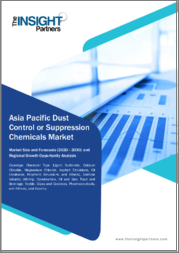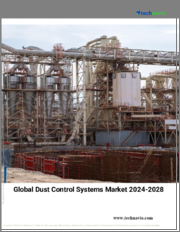
|
시장보고서
상품코드
1533065
아시아태평양의 분진 방지제/억제제 시장 예측(-2030년) - 지역별 분석 : 화학제품 유형별, 최종 이용 산업별Asia Pacific Dust Control or Suppression Chemicals Market Forecast to 2030 - Regional Analysis - by Chemical Type and End-Use Industry |
||||||
아시아태평양의 분진 방지제/억제제 시장은 2022년에 3억 6,331만 달러로 평가되며, 2030년에는 5억 1,283만 달러에 달할 것으로 예상되며, 2022년부터 2030년까지 연평균 4.4% 성장할 것으로 예상됩니다.
제약 및 식품 가공 산업의 강력한 성장으로 아시아태평양의 분진 방지제/억제제 시장 성장 촉진
아시아태평양 의약품 시장은 북미에 이어 세계 2위를 차지하고 있습니다. 2021년까지 아시아태평양 시장은 현재 3위인 서유럽을 넘어설 것으로 예상됩니다. 그 배경에는 인구 규모, 특히 노인 인구, 1인당 GDP, 의료비, 규제 프레임워크, 의사의 인식, 질병 유행 등 여러 가지 요인이 있습니다. 예를 들어, Invest India에 따르면 인도의 의약품 시장은 2024년 650억 달러, 2030년 1,300억 달러 규모로 성장할 것으로 예상됩니다. 제약 산업의 발전은 기술 혁신을 촉진하고 국내에서 임상 연구를 수행할 수 있는 환경을 조성합니다. 원료 의약품 제조, 정제 프레스, 정제 코팅, 분무 건조, 과립화 등 제약 공정은 분진 발생을 유발할 수 있습니다.
현재 아시아태평양에서 가공식품의 양은 국가별로 차이가 있습니다. 일본은 아시아에서 가장 큰 식품 가공 시장을 보유하고 있지만, 시장 포화로 인해 향후 중국이나 인도보다 성장이 둔화될 것으로 예상됩니다. 중국과 인도의 식품 가공 부문은 일인당 소득 증가, 노동계급 확대, 조리된 식품의 인기 상승에 힘입어 성장할 것으로 예상됩니다. 국제 무역 협정 및 지역 무역 협정으로 인한 무역 자유화는 아시아태평양의 식품 가공 부문의 성장을 촉진하고 시장 진입 기업에게 시장 접근성 확대를 가져다 줄 것입니다. 예를 들어, 2021년 4월부터 2022년 3월까지 인도의 식품 가공 부문에 대한 직접 투자액은 7억 972만 달러에 달했습니다. 또한 태국은 현재 급속한 발전으로 동남아시아 전체에서 가장 발전된 식품 가공 산업 중 하나를 보유하고 있습니다. 많은 중규모 이상의 식품 가공업체들이 국내 시장과 국제 시장 모두에 더 높은 품질의 제품을 생산하고 있으며, 2020년 태국의 가공식품 수출액은 194억 달러에 달했습니다. 분진 방지제/억제제는 식품 안전과 직원 건강 측면에서 식품 가공의 중요한 측면입니다. 가공 환경에 먼지가 존재하면 위생 문제, 미생물 오염, 건강 문제 및 기타 위험을 초래할 수 있습니다. 식품 가공 업체는 또한 여러 정부 기관 및 국제기구의 식품 가공 먼지 관리에 대한 규정을 준수하고 있습니다. 따라서 식품 가공 산업의 강력한 존재는 분진 방지제/억제제 시장에 유리한 기회를 창출할 것으로 예상됩니다.
아시아태평양의 분진 방지제/억제제 시장 개요
아시아태평양은 도시화가 진행되면서 상업 및 주거 프로젝트 건설이 증가하고 있습니다. 또한, 이 지역의 1인당 소득은 저렴한 주거용 건물의 개발과 함께 증가하고 있습니다. 아시아태평양에 외국계 기업의 진출이 증가함에 따라 새로운 사무실, 생산 기지 및 건물에 대한 수요가 생겨나면서 이 지역의 건설 부문을 주도하고 있습니다. 따라서 이 지역의 건설 산업의 성장은 먼지 억제제에 대한 수요를 증가시키고 있습니다.
아시아태평양은 중국과 인도가 가장 많이 소비하는 지역으로 세계 시장을 독점하고 있습니다. 인도 정부는 고속도로 네트워크를 강화하기 위해 6만 6,100km의 경제 회랑, 고속도로, 국경 및 해안 도로를 건설하는 인프라 프로젝트를 시작했습니다. 마찬가지로 국제무역국에 따르면 2019년부터 2021년까지 중국 건설업의 수익은 9,680억 달러에서 1조 1,000억 달러로 증가할 것으로 예상됩니다. 중국의 도시화 속도는 세계에서 가장 높은 수준입니다. 따라서 인도의 도로 및 고속도로 건설에 대한 막대한 투자와 중국 건설 산업의 성장으로 인해 먼지 억제제 시장은 예측 기간 동안 크게 성장할 것으로 예상됩니다.
아시아태평양의 분진 방지제/억제제 시장 매출 및 2030년까지의 예측(금액)
아시아태평양의 분진 방지제/억제제 시장 세분화
아시아태평양의 분진 방지제/억제제 시장은 화학제품 유형, 최종 사용 산업, 국가별로 세분화됩니다. 화학제품 유형별로 아시아태평양의 분진 방지제/억제제 시장은 리그닌 설포네이트, 염화칼슘, 염화마그네슘, 아스팔트 에멀전, 오일 에멀전, 폴리머 에멀전, 기타로 세분화됩니다. 염화칼슘 부문은 2022년 가장 큰 시장 점유율을 차지했습니다.
최종 사용 산업 측면에서 아시아태평양의 분진 방지제/억제제 시장은 광업, 건설, 석유 및 가스, 식품 및 식음료, 섬유, 유리 및 세라믹, 제약, 기타로 분류되며, 2022년에는 광업 부문이 가장 큰 시장 점유율을 차지했습니다.
국가별로 보면 아시아태평양의 분진 방지제/억제제 시장은 호주, 중국, 인도, 일본, 한국, 기타 아시아태평양으로 구분되며, 2022년 아시아태평양의 분진 방지제/억제제 시장 점유율은 중국이 독식했습니다.
Benetech Inc, Veolia Environnement SA, Ecolab Inc, Quaker Chemical Corp, Dow Inc, BASF SE, Solenis LLC, Borregaard ASA는 아시아태평양의 분진 방지제/억제제 시장에서 사업을 운영하는 주요 기업 중 일부입니다. 아시아태평양의 분진 방지제/억제제 시장에서 사업을 운영하는 주요 기업 중 일부입니다.
목차
제1장 소개
제2장 주요 요약
- 주요 시장 인사이트
- 시장 매력
제3장 조사 방법
- 조사 범위
- 2차 조사
- 1차 조사
제4장 아시아태평양의 분진 방지제/억제제 시장 상황
- Porter's Five Forces 분석
- 공급 기업의 교섭력
- 구매자의 교섭력
- 신규 참여업체의 위협
- 경쟁 기업 간의 경쟁 관계
- 대체품의 위협
- 생태계 분석
제5장 아시아태평양의 분진 방지제/억제제 시장 : 주요 산업 역학
- 시장 성장 촉진요인
- 건설 업계의 분진 방지제/억제제 수요 증가
- 광업 부문의 투자와 조업 증가
- 시장 성장 억제요인
- 대체품의 입수 가능성
- 시장 기회
- 제약·식품 가공 산업의 강력한 성장
- 향후 동향
- 바이오 기반 분진 억제제에 관한 연구
- 성장 촉진요인과 억제요인의 영향
제6장 분진 방지제/억제제 시장 : 아시아태평양의 시장 분석
- 분진 방지제/억제제 시장 매출, 2022-2030년
- 분진 방지제/억제제 시장 수량(킬로톤), 2022-2030년
- 분진 방지제/억제제 시장 예측과 분석
제7장 아시아태평양의 분진 방지제/억제제 시장 분석 : 화학제품 유형별
- 리그닌 설폰산염
- 염화칼슘
- 염화 마그네슘
- 아스팔트 에멀전
- 오일 에멀전
- 폴리머 에멀전
- 기타
제8장 아시아태평양의 분진 방지제/억제제 시장 분석 : 최종 이용 산업별
- 광업
- 건설
- 석유 및 가스
- 식품·음료
- 섬유
- 유리·세라믹
- 의약품
- 기타
제9장 아시아태평양의 분진 방지제/억제제 시장 : 국가별 분석
제10장 업계 상황
- 제품 발매
제11장 경쟁 상황
- 주요 기업에 의한 히트맵 분석
제12장 기업 개요
- Benetech Inc
- Veolia Environnement SA
- Ecolab Inc
- Quaker Chemical Corp
- Dow Inc
- BASF SE
- Solenis LLC
- Borregaard ASA
제13장 부록
ksm 24.09.04The Asia Pacific dust control or suppression chemicals market was valued at US$ 363.31 million in 2022 and is expected to reach US$ 512.83 million by 2030; it is estimated to record a CAGR of 4.4% from 2022 to 2030.
Strong Growth in Pharmaceutical and Food Processing Industry Boosts Asia Pacific Dust Control or Suppression Chemicals Market
The pharmaceutical market in Asia Pacific is the second largest globally, following that of North America. It is anticipated that the Asia Pacific market will surpass Western Europe, which is presently ranked third, by 2021. Numerous factors are responsible for this, including the size of the population, particularly the geriatric population, GDP per capita, health care costs, regulatory frameworks, attitudes of physicians, and the prevalence of disease. For instance, as per Invest India, it is anticipated that India's pharmaceutical market will grow to US$ 65 billion and US$ 130 billion by 2024 and 2030, respectively. The development of the pharmaceutical industry boosts innovation and creates a conducive environment for conducting clinical research in the country. Pharmaceutical processes such as active pharmaceutical ingredients production, tablet presses, tablet coating, spray drying, and granulation lead to dust formation.
Currently, the amount of processed food varies from nation to nation in the Asia-Pacific region. Japan continues to have the biggest food processing market in Asia, but due to market saturation, it is predicted to grow more slowly in the future than China and India. The food processing sectors in China and India are anticipated to be driven by rising per capita income, an expanding working class, and the growing popularity of ready-to-eat food. Trade liberalization brought about by international and regional trade agreements is fostering growth in the Asia-Pacific food processing sector and will provide industry participants with increased access to markets. For instance, the FDI in India's food processing sector was US$ 709.72 million during April 2021-March 2022. Also, Thailand now possesses one of the most advanced food processing industries in all of Southeast Asia, owing to its rapid development. Many medium-sized and larger food processors create higher-quality goods for both local and international markets. In 2020, Thai exports of processed foods were valued at US$ 19.4 billion. Dust control or suppression is a significant aspect of food processing from both food safety and employee health perspective. The presence of dust in the processing environment can cause sanitation concerns, microbial contamination, health issues, and other hazards. Food processors also adhere to regulations for controlling food processing dust by several government and international authorities. Thus, strong presence of food processing industry is projected to create lucrative opportunities for the dust control or suppression chemicals market.
Asia Pacific Dust Control or Suppression Chemicals Market Overview
Asia Pacific is witnessing urbanization and the rising construction of commercial and residential projects. Additionally, the per capita income in the region has been increasing, coupled with the development of affordable residential buildings. The increasing expansion of foreign companies in Asia Pacific has created a demand for new offices, production houses, and buildings, thereby driving the construction sector in the region. Thus, the growing construction industry in the region boosts the demand for dust suppressant chemicals.
Asia Pacific dominated the market worldwide, with the largest consumption coming from China and India. The Government of India launched an infrastructure project to build 66,100 km of economic corridors, expressways, and border & coastal roads to boost the highway network. Similarly, according to the International Trade Administration, from 2019 to 2021, China's construction industry revenue is expected to increase from US$ 968 billion to US$ 1.1 trillion. China's urbanization rate is among the highest in the world. Thus, with the huge investment in roads and highway construction in India and the growing construction industry in China, the dust suppressant chemicals market is estimated to grow considerably during the forecast period.
Asia Pacific Dust Control or Suppression Chemicals Market Revenue and Forecast to 2030 (US$ Million)
Asia Pacific Dust Control or Suppression Chemicals Market Segmentation
The Asia Pacific dust control or suppression chemicals market is segmented based on chemical type, end-use industry, and country. Based on chemical type, the Asia Pacific dust control or suppression chemicals market is segmented into lignin sulfonate, calcium chloride, magnesium chloride, asphalt emulsions, oil emulsions, polymeric emulsions, and others. The calcium chloride segment held the largest market share in 2022.
In terms of end-use industry, the Asia Pacific dust control or suppression chemicals market is categorized into mining, construction, oil and gas, food and beverage, textile, glass and ceramics, pharmaceuticals, and others. The mining segment held the largest market share in 2022.
Based on country, the Asia Pacific dust control or suppression chemicals market is segmented into Australia, China, India, Japan, South Korea, and the Rest of Asia Pacific. China dominated the Asia Pacific dust control or suppression chemicals market share in 2022.
Benetech Inc, Veolia Environnement SA, Ecolab Inc, Quaker Chemical Corp, Dow Inc, BASF SE, Solenis LLC, and Borregaard ASA are some of the leading players operating in the Asia Pacific dust control or suppression chemicals market.
Table Of Contents
1. Introduction
- 1.1 The Insight Partners Research Report Guidance
- 1.2 Market Segmentation
2. Executive Summary
- 2.1 Key Market Insights
- 2.2 Market Attractiveness
3. Research Methodology
- 3.1 Coverage
- 3.2 Secondary Research
- 3.3 Primary Research
4. Asia Pacific Dust Control or Suppression Chemicals Market Landscape
- 4.1 Overview
- 4.2 Porter's Five Forces Analysis
- 4.2.1 Bargaining Power of Suppliers
- 4.2.2 Bargaining Power of Buyers
- 4.2.3 Threat of New Entrants
- 4.2.4 Intensity of Competitive Rivalry
- 4.2.5 Threat of Substitutes
- 4.3 Ecosystem Analysis
5. Asia Pacific Dust Control or Suppression Chemicals Market - Key Industry Dynamics
- 5.1 Market Drivers
- 5.1.1 Rising Demand for Dust Control or Suppression Chemicals from Construction Industry
- 5.1.2 Increasing Investments and Operations in Mining Sector
- 5.2 Market Restraints
- 5.2.1 Availability of Alternatives
- 5.3 Market Opportunities
- 5.3.1 Strong Growth in Pharmaceutical and Food Processing Industry
- 5.4 Future Trends
- 5.4.1 Research Related to Bio-Based Dust Suppression Agents
- 5.5 Impact of Drivers and Restraints:
6. Dust Control or Suppression Chemicals Market - Asia Pacific Market Analysis
- 6.1 Dust Control or Suppression Chemicals Market Revenue (US$ Million), 2022 - 2030
- 6.2 Dust Control or Suppression Chemicals Market Volume (Kilo Tons), 2022 - 2030
- 6.3 Dust Control or Suppression Chemicals Market Forecast and Analysis
7. Asia Pacific Dust Control or Suppression Chemicals Market Analysis - Chemical Type
- 7.1 Lignin Sulfonate
- 7.1.1 Overview
- 7.1.2 Lignin Sulfonate Market Revenue and Forecast to 2030 (US$ Million)
- 7.1.3 Lignin Sulfonate Market Volume and Forecast to 2030 (Kilo Tons)
- 7.2 Calcium Chloride
- 7.2.1 Overview
- 7.2.2 Calcium Chloride Market Revenue and Forecast to 2030 (US$ Million)
- 7.2.3 Calcium Chloride Market Volume and Forecast to 2030 (Kilo Tons)
- 7.3 Magnesium Chloride
- 7.3.1 Overview
- 7.3.2 Magnesium Chloride Market Revenue and Forecast to 2030 (US$ Million)
- 7.3.3 Magnesium Chloride Market Volume and Forecast to 2030 (Kilo Tons)
- 7.4 Asphalt Emulsions
- 7.4.1 Overview
- 7.4.2 Asphalt Emulsions Market Revenue and Forecast to 2030 (US$ Million)
- 7.4.3 Asphalt Emulsions Market Volume and Forecast to 2030 (Kilo Tons)
- 7.5 Oil Emulsions
- 7.5.1 Overview
- 7.5.2 Oil Emulsions Market Revenue and Forecast to 2030 (US$ Million)
- 7.5.3 Oil Emulsions Market Volume and Forecast to 2030 (Kilo Tons)
- 7.6 Polymeric Emulsions
- 7.6.1 Overview
- 7.6.2 Polymeric Emulsions Market Revenue and Forecast to 2030 (US$ Million)
- 7.6.3 Polymeric Emulsions Market Volume and Forecast to 2030 (Kilo Tons)
- 7.7 Others
- 7.7.1 Overview
- 7.7.2 Others Market Revenue and Forecast to 2030 (US$ Million)
- 7.7.3 Others Market Volume and Forecast to 2030 (Kilo Tons)
8. Asia Pacific Dust Control or Suppression Chemicals Market Analysis - End-Use Industry
- 8.1 Mining
- 8.1.1 Overview
- 8.1.2 Mining Market Revenue and Forecast to 2030 (US$ Million)
- 8.2 Construction
- 8.2.1 Overview
- 8.2.2 Construction Market Revenue and Forecast to 2030 (US$ Million)
- 8.3 Oil and Gas
- 8.3.1 Overview
- 8.3.2 Oil and Gas Market Revenue and Forecast to 2030 (US$ Million)
- 8.4 Food and Beverage
- 8.4.1 Overview
- 8.4.2 Food and Beverage Market Revenue and Forecast to 2030 (US$ Million)
- 8.5 Textile
- 8.5.1 Overview
- 8.5.2 Textile Market Revenue and Forecast to 2030 (US$ Million)
- 8.6 Glass and Ceramics
- 8.6.1 Overview
- 8.6.2 Glass and Ceramics Market Revenue and Forecast to 2030 (US$ Million)
- 8.7 Pharmaceuticals
- 8.7.1 Overview
- 8.7.2 Pharmaceuticals Market Revenue and Forecast to 2030 (US$ Million)
- 8.8 Others
- 8.8.1 Overview
- 8.8.2 Others Market Revenue and Forecast to 2030 (US$ Million)
9. Asia Pacific Dust Control or Suppression Chemicals Market - by Country Analysis
- 9.1 Asia Pacific Dust Control or Suppression Chemicals Market
- 9.1.1 Overview
- 9.1.1.1 Dust Control or Suppression Chemicals Market Breakdown by Country
- 9.1.1.2 Australia Dust Control or Suppression Chemicals Market Revenue and Forecasts to 2030 (US$ Mn)
- 9.1.1.3 Australia Dust Control or Suppression Chemicals Market Volume and Forecasts to 2030 (Kilo Tons)
- 9.1.1.3.1 Australia Dust Control or Suppression Chemicals Market Breakdown by Chemical Type
- 9.1.1.3.2 Australia Dust Control or Suppression Chemicals Market Breakdown by End-Use Industry
- 9.1.1.4 China Dust Control or Suppression Chemicals Market Revenue and Forecasts to 2030 (US$ Mn)
- 9.1.1.5 China Dust Control or Suppression Chemicals Market Volume and Forecasts to 2030 (Kilo Tons)
- 9.1.1.5.1 China Dust Control or Suppression Chemicals Market Breakdown by Chemical Type
- 9.1.1.5.2 China Dust Control or Suppression Chemicals Market Breakdown by End-Use Industry
- 9.1.1.6 India Dust Control or Suppression Chemicals Market Revenue and Forecasts to 2030 (US$ Mn)
- 9.1.1.7 India Dust Control or Suppression Chemicals Market Volume and Forecasts to 2030 (Kilo Tons)
- 9.1.1.7.1 India Dust Control or Suppression Chemicals Market Breakdown by Chemical Type
- 9.1.1.7.2 India Dust Control or Suppression Chemicals Market Breakdown by End-Use Industry
- 9.1.1.8 Japan Dust Control or Suppression Chemicals Market Revenue and Forecasts to 2030 (US$ Mn)
- 9.1.1.9 Japan Dust Control or Suppression Chemicals Market Volume and Forecasts to 2030 (Kilo Tons)
- 9.1.1.9.1 Japan Dust Control or Suppression Chemicals Market Breakdown by Chemical Type
- 9.1.1.9.2 Japan Dust Control or Suppression Chemicals Market Breakdown by End-Use Industry
- 9.1.1.10 South Korea Dust Control or Suppression Chemicals Market Revenue and Forecasts to 2030 (US$ Mn)
- 9.1.1.11 South Korea Dust Control or Suppression Chemicals Market Volume and Forecasts to 2030 (Kilo Tons)
- 9.1.1.11.1 South Korea Dust Control or Suppression Chemicals Market Breakdown by Chemical Type
- 9.1.1.11.2 South Korea Dust Control or Suppression Chemicals Market Breakdown by End-Use Industry
- 9.1.1.12 Rest of Asia Pacific Dust Control or Suppression Chemicals Market Revenue and Forecasts to 2030 (US$ Mn)
- 9.1.1.13 Rest of Asia Pacific Dust Control or Suppression Chemicals Market Volume and Forecasts to 2030 (Kilo Tons)
- 9.1.1.13.1 Rest of Asia Pacific Dust Control or Suppression Chemicals Market Breakdown by Chemical Type
- 9.1.1.13.2 Rest of Asia Pacific Dust Control or Suppression Chemicals Market Breakdown by End-Use Industry
- 9.1.1 Overview
10. Industry Landscape
- 10.1 Overview
- 10.2 Product launch
11. Competitive Landscape
- 11.1 Heat Map Analysis by Key Players
12. Company Profiles
- 12.1 Benetech Inc
- 12.1.1 Key Facts
- 12.1.2 Business Description
- 12.1.3 Products and Services
- 12.1.4 Financial Overview
- 12.1.5 SWOT Analysis
- 12.1.6 Key Developments
- 12.2 Veolia Environnement SA
- 12.2.1 Key Facts
- 12.2.2 Business Description
- 12.2.3 Products and Services
- 12.2.4 Financial Overview
- 12.2.5 SWOT Analysis
- 12.2.6 Key Developments
- 12.3 Ecolab Inc
- 12.3.1 Key Facts
- 12.3.2 Business Description
- 12.3.3 Products and Services
- 12.3.4 Financial Overview
- 12.3.5 SWOT Analysis
- 12.3.6 Key Developments
- 12.4 Quaker Chemical Corp
- 12.4.1 Key Facts
- 12.4.2 Business Description
- 12.4.3 Products and Services
- 12.4.4 Financial Overview
- 12.4.5 SWOT Analysis
- 12.4.6 Key Developments
- 12.5 Dow Inc
- 12.5.1 Key Facts
- 12.5.2 Business Description
- 12.5.3 Products and Services
- 12.5.4 Financial Overview
- 12.5.5 SWOT Analysis
- 12.5.6 Key Developments
- 12.6 BASF SE
- 12.6.1 Key Facts
- 12.6.2 Business Description
- 12.6.3 Products and Services
- 12.6.4 Financial Overview
- 12.6.5 SWOT Analysis
- 12.6.6 Key Developments
- 12.7 Solenis LLC
- 12.7.1 Key Facts
- 12.7.2 Business Description
- 12.7.3 Products and Services
- 12.7.4 Financial Overview
- 12.7.5 SWOT Analysis
- 12.7.6 Key Developments
- 12.8 Borregaard ASA
- 12.8.1 Key Facts
- 12.8.2 Business Description
- 12.8.3 Products and Services
- 12.8.4 Financial Overview
- 12.8.5 SWOT Analysis
- 12.8.6 Key Developments



















